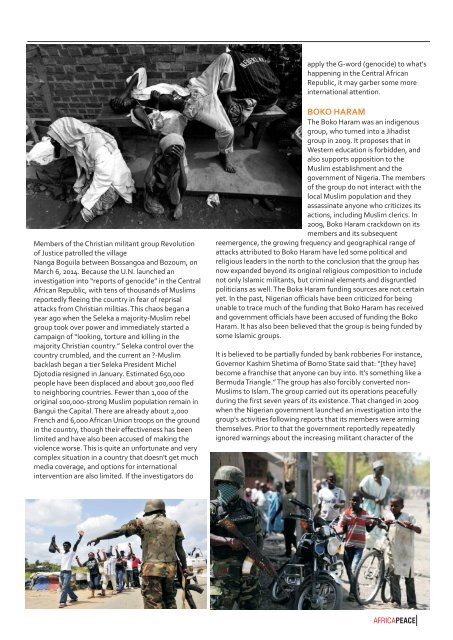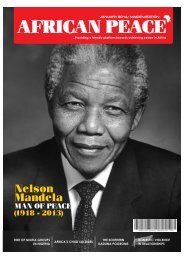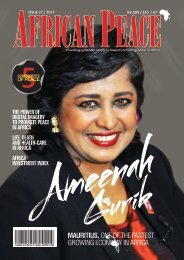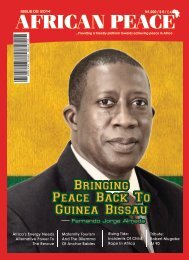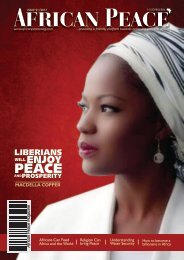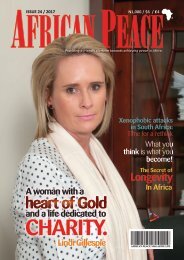AP mag
African Peace Magazine
African Peace Magazine
You also want an ePaper? Increase the reach of your titles
YUMPU automatically turns print PDFs into web optimized ePapers that Google loves.
apply the G-word (genocide) to what's<br />
happening in the Central African<br />
Republic, it may garber some more<br />
international attention.<br />
Members of the Christian militant group Revolution<br />
of Justice patrolled the village<br />
Nanga Boguila between Bossangoa and Bozoum, on<br />
March 6, 2014. Because the U.N. launched an<br />
investigation into “reports of genocide” in the Central<br />
African Republic, with tens of thousands of Muslims<br />
reportedly fleeing the country in fear of reprisal<br />
attacks from Christian militias. This chaos began a<br />
year ago when the Seleka a majority-Muslim rebel<br />
group took over power and immediately started a<br />
campaign of “looking, torture and killing in the<br />
majority Christian country.” Seleka control over the<br />
country crumbled, and the current an ?-Muslim<br />
backlash began a tier Seleka President Michel<br />
Djotodia resigned in January. Estimated 650,000<br />
people have been displaced and about 300,000 fled<br />
to neighboring countries. Fewer than 1,000 of the<br />
original 100,000-strong Muslim population remain in<br />
Bangui the Capital. There are already about 2,000<br />
French and 6,000 African Union troops on the ground<br />
in the country, though their effectiveness has been<br />
limited and have also been accused of making the<br />
violence worse. This is quite an unfortunate and very<br />
complex situation in a country that doesn't get much<br />
media coverage, and options for international<br />
intervention are also limited. If the investigators do<br />
BOKO HARAM<br />
The Boko Haram was an indigenous<br />
group, who turned into a Jihadist<br />
group in 2009. It proposes that in<br />
Western education is forbidden, and<br />
also supports opposition to the<br />
Muslim establishment and the<br />
government of Nigeria. The members<br />
of the group do not interact with the<br />
local Muslim population and they<br />
assassinate anyone who criticizes its<br />
actions, including Muslim clerics. In<br />
2009, Boko Haram crackdown on its<br />
members and its subsequent<br />
reemergence, the growing frequency and geographical range of<br />
attacks attributed to Boko Haram have led some political and<br />
religious leaders in the north to the conclusion that the group has<br />
now expanded beyond its original religious composition to include<br />
not only Islamic militants, but criminal elements and disgruntled<br />
politicians as well. The Boka Haram funding sources are not certain<br />
yet. In the past, Nigerian officials have been criticized for being<br />
unable to trace much of the funding that Boko Haram has received<br />
and government officials have been accused of funding the Boko<br />
Haram. It has also been believed that the group is being funded by<br />
some Islamic groups.<br />
It is believed to be partially funded by bank robberies For instance,<br />
Governor Kashim Shetima of Borno State said that: “[they have]<br />
become a franchise that anyone can buy into. It's something like a<br />
Bermuda Triangle.” The group has also forcibly converted non-<br />
Muslims to Islam. The group carried out its operations peacefully<br />
during the first seven years of its existence. That changed in 2009<br />
when the Nigerian government launched an investigation into the<br />
group's activities following reports that its members were arming<br />
themselves. Prior to that the government reportedly repeatedly<br />
ignored warnings about the increasing militant character of the<br />
AFRIC<strong>AP</strong>EACE


